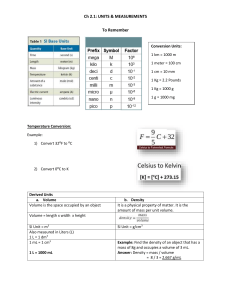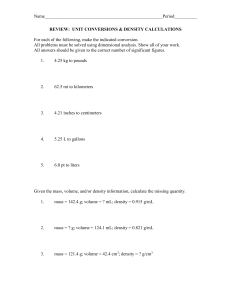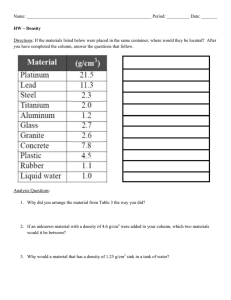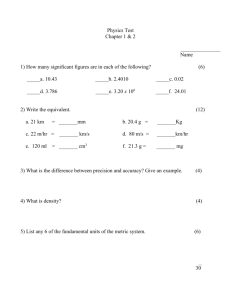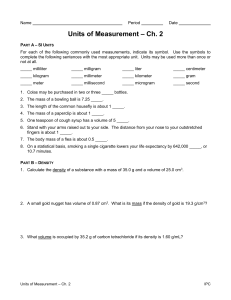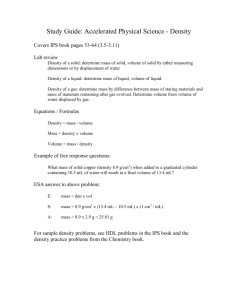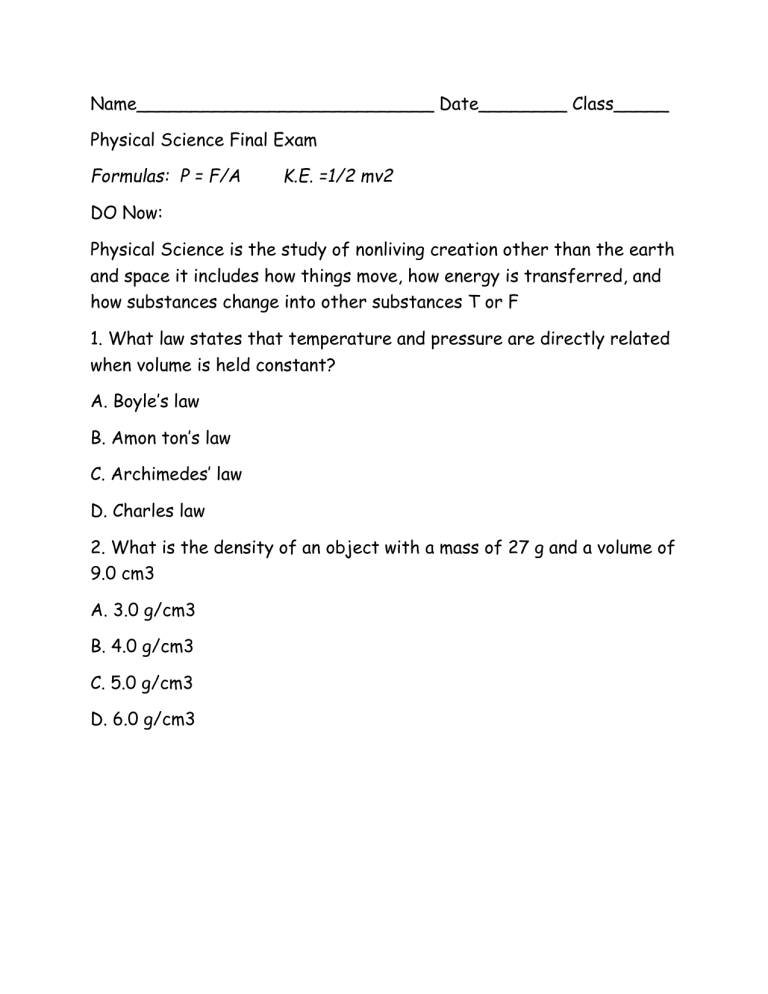
Name___________________________ Date________ Class_____ Physical Science Final Exam Formulas: P = F/A K.E. =1/2 mv2 DO Now: Physical Science is the study of nonliving creation other than the earth and space it includes how things move, how energy is transferred, and how substances change into other substances T or F 1. What law states that temperature and pressure are directly related when volume is held constant? A. Boyle’s law B. Amon ton’s law C. Archimedes’ law D. Charles law 2. What is the density of an object with a mass of 27 g and a volume of 9.0 cm3 A. 3.0 g/cm3 B. 4.0 g/cm3 C. 5.0 g/cm3 D. 6.0 g/cm3 3. How many significant digits are in 0.02063 A. 3 B. 4 C. 5 D. 6 4. What is the attractive force between unlike molecules? A. cohesion B. surface tension C. capillarity D. adhesion 5. What device measures altitude A. thermometer B. barometer C. hydrometer D. altimeter 6. What is the average speed of a person who walks 28 km in 7.0 hr A. 2.0 km/h B. 4.0 km/h C. 8.0 km/h D. 10 km/h 7. What law states that the force required to accelerated an object at a certain rate equals the object’s mass times the desired acceleration? A. law of conservation of momentum B. first law of motion C. second law of motion D. third law of motion 8. What is the product of an objects mass and velocity? A. force B. momentum C. power D. friction 9. What principle states that the buoyant force experienced by and object is exactly equal to the weight of the object displaced A. pascal’s principle B. Boyle’s principle C. Bernoulli’s principle D. Archimedes principle 10. What is the SI unit of pressure? A. pascal B. standard atmosphere C. torr D. bar 11. Who discovered the laws of motion and gravitation? A. Galileo Galilei B. Sir Isaac Newton C. James Clerk Maxwell D. Enrico Fermi 12. What is the fluid friction that tends to slow an object as it moves through a fluid? A. drag B. streamlining C. lift D. angle of attack 13. What property of a gas must remain constant for Boyle’s law to be uses _________________________ 14. What system of measurement was designed by French scientists to be simpler to learn and use than the F.P.S system __________________________________________ 15. What law states that the pressure of a gas is constant. Its volume and temperature are directly proportional? __________________ 16. What is the ability for other scientists to reach the same conclusion by performing the same experiment under different conditions and by performing other experiments to test the same hypothesis A. falsifiability B. repeatability C. testability D. reproducibility 17. What is the amount of gravitational pull on an object? A. mass B. weight C. volume D. density 18. Which of the following expresses 2702 correctly in scientific notation A. 2.702 x 103 B. 2.702 x 10-3 C. 270.2 x 103 D. 27.02 x 10-3 19. What is the force per unit area? A. surface tension B. cohesion C. pressure D. capillarity 20. What is a factor that is changed to test a hypothesis? A. control group B. independent variable C. control variable D. dependent variable 21. A hollow silver cube has a mass of 30 g and a volume of 35 cm3 How much mass must be placed inside the cube neutral buoyancy in water which has a density of 1.00 g/cm3 A. 0.83 g B. 5.0 g C. 10 g D. 15 g 22. The amount of matter in a object is_________________ 23. The metric prefix that means 1/100 is______________ 24. The state of matter which molecules can move freely and conform to the shape of the container but remains attracted is the __________ state 25. The closeness of a measurement to the quantity’s actual value is its_________________ 26. When a glass of water spills on a table why does the water bead and puddle instead of flattening to the smooth surface? A. The water coheres and pulls back from the table B. The water adheres to the table C. The water moves over the table because of gravity 27. What is the energy of motion ______________ ____________ 28. Energy associated with the position of an object and the forces acting on the object is _______________ energy 29. A 2500 kg truck is traveling at 20 m/s. What is the kinetic energy of the truck? K.E = 1/2mv2 30. What is the kinetic energy of a 0.145 kg basketball thrown at a speed of 40.2 m/s2
